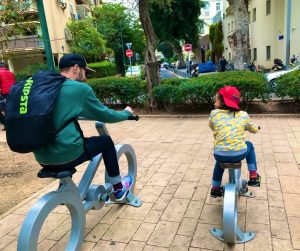Reflection on being a gay adoptive dad

It was at a food shop. (It’s almost always at a food shop, get ready.) My partner and son were filling a basket with reduced-price Ben & Jerry’s. I wasn’t there. “Be sure to get some for mum too”, the smiley shop assistant said. And as much as we prepare the responses they never come out as planned, because we’re never prepared for when they’ll be needed. So neither my six year-old nor my partner said anything as they enjoyed the cold air from the freezer on their sweat-soaked shirts from a bike-ride.
At the time of going through the adoption process, the process seemed to be everything – the training, the social worker visits, the family trees and support networks. But that all feels like some distant dream amongst the football games, the holidays, the Lego… because as much as that foreboding process feels like your whole life at the time, it’s such a small part in the bigger, wonderful, journey of being a parent.
I was prepared in attachment theory, child-development, the importance of contact with birth family….but unprepared for the small talk with strangers on the tube, shopkeepers, even the doctor – all of whom wanted to know what mum was up today, and wasn’t it nice that dad had taken you today, and did daddy dress you today? (Apparently I failed to inherit the gay fashion gene.) Some days I ignored the strangers – a vacant smile – most days I corrected them.
Which is why adoption support groups became a lifeline. New Family Social and We Are Family were playgroups where we could be ourselves, where we didn’t need to explain or contextualise our lives. And where it made me realise how important it was for me and for my son to see families that looked like us. Remember that support network we had to do during the process? Half of them disappeared when we became dads. (Perhaps they went to the same mysterious place my son’s socks slip away to.) But they were replaced by fast friends we met at these groups. LGBTQ+ people have always been familiar with “making our own families”, something we’ve been doing for centuries after leaving home or escaping friends and family who maybe didn’t accept us. And through these support groups we were able to make our own extended families too. My son may be the only one with two dads in his class, but through our newfound support network, he knows many other families with two dads, or two mums, or where dad or mum are trans. And the kids in his class all know about LGBTQ+ families now too. We make sure to volunteer in class, to make ourselves visible. We go in to light our menorah with the kids on Hanukkah, and dip apples and honey on Rosh Hashanah.
As my son gets older – he’s been with us 6 years now – I realise how much my anxieties about him feeling ‘different’ having two dads were unwarranted. Like any kid, his primary concerns are when can he go outside and play football and what’s for pudding.
“That was strange what she said”, my son reflected while carrying armfuls of ice cream. And then he pivoted, and returned to the now empty freezer. “The ice cream’s not for my mum,” he told the shop assistant, “It’s for my other dad.”
We no longer have to correct people. Our son now does it for us.
